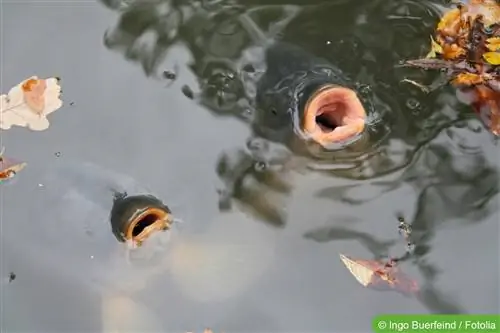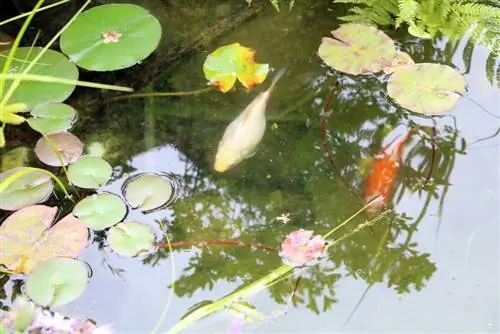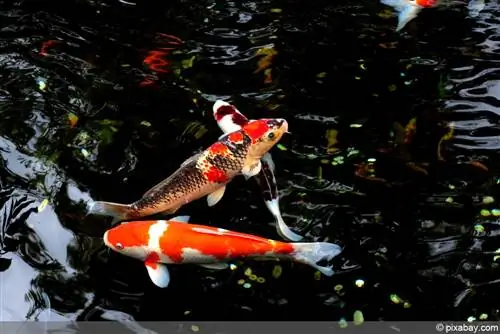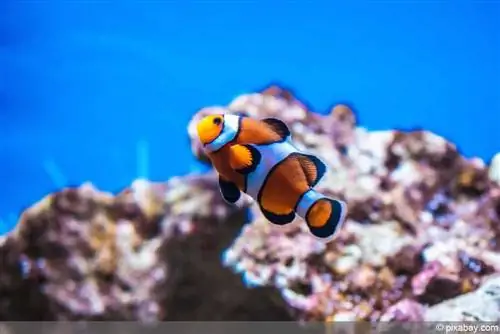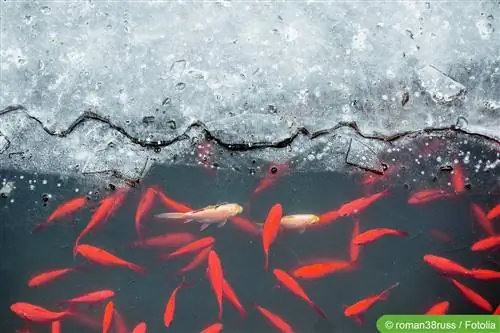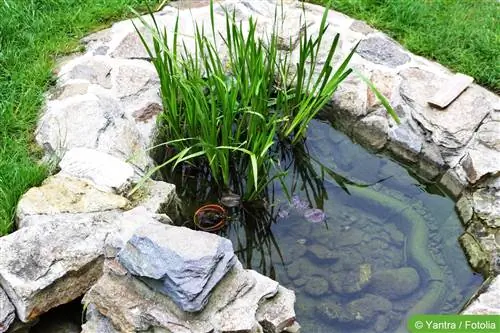- Author admin caroline@plants-knowledge.com.
- Public 2023-12-17 03:39.
- Last modified 2025-06-01 06:48.
Many garden pond owners will be familiar with the following problem: Some fish suddenly swim to the surface of the water and gasp for air. When this fish behavior occurs for the first time, many owners don't know what the problem is in the tank and what consequences it has for the fish. Since there can be several reasons for swimming on the surface, read the most important reasons and methods of improvement here.
Gasping for air in the garden pond
One of the most common reasons for gasping for air in the garden pond can be too little oxygen in the water. As a first step, every owner should either add oxygen or check the oxygen pump for damage. The addition of oxygen usually helps to give the fish a carefree stay in the pond again. But there are other reasons that you should consider. In addition to the lack of oxygen, the pH value is of great importance. There should be a constant pH value in the pond to keep the fish he althy and happy. If this pH value changes, this can have consequences for the fish. Every owner should regularly check the pH value in their pond, otherwise excessive nitrite levels could poison the fish. You can tell whether the fish are already suffering from such poisoning by the typical gasping for air on the surface. In addition, the animals move much slower, only float in the water and their hearts beat slower. Often there is no longer any help for the affected fish.
If the nitrite value is too high and the water is contaminated, you should change the water immediately. A water change of 40% can also help to neutralize the pH value in the pool. The nitrite value must not be higher than 0.5 mg per liter. If the value is higher, the water needs to be changed again. A pH value below 7 is a good value because this is ammonium. If the value is above 7, the ammonium changes into ammonia and this is harmful to the fish. The fish ingest the ammonia and ammonia poisoning could occur. An ideal and constant pH value should be 6.9.
Changes in fish due to external influences
To give fish a he althy and happy life, clean water is the most important element:
- Every pond owner should check their water every day and take action if impurities occur.
- Once a fish is poisoned or a nitrite level that is too high spreads, the water in the pond can “tip over” very quickly.
- Other influences such as dirt, leaves and branches should be permanently and regularly removed from the pool.
- If the owner is careless, this can cause long-term damage to the fish.
- If it is very warm, this can also have an impact on the quality of the water.
In very warm temperatures, the oxygen level drops, which, as described above, is one of the main reasons for gasping for air. Since the pond is in the garden, you often don't have as precise a temperature control as in an aquarium tank.
Preventive measures for a he althy fish tank
There are some tools that permanently protect the garden pond from contamination and keep the water clean. In order to give the fish enough oxygen at all times, it makes sense to install an oxygen activator. It can be turned on at the push of a button and adds oxygen to the pond. In order to prevent the water from “tipping”, you should also rethink your feeding behavior. Too much food at once can contaminate the water because the fish cannot absorb that much food immediately. It makes more sense to feed the fish more often but only when the food is used up. You should also check the water quality after a heavy rainy season, as the rain can also change the composition of the water.
Especially in autumn and at the beginning of winter, it is important to regularly remove leaves and other debris from the pond. Leaves lying on the surface can be easily removed with a net. There are also special plants that help maintain an even water environment. You can permanently prevent or reduce contamination and bacteria if you leave the pond filter running all day. The filter cleans the water all day long. If you only turn the filter on for a few hours, it won't be able to clear the entire pond of bacteria.
Ruling out diseases
If you notice that something is wrong in the pond, you should also consciously observe the fish. If the situation is still not under control after checking the water and adding oxygen, illness could be another reason. You should consciously take the time and observe the animals closely. When it comes to fish diseases, there are also some remedies that can help the fish get better. If only one or two animals are affected, they should be quickly moved to a separate pool (or, in an emergency, a clean rain barrel) and treated.
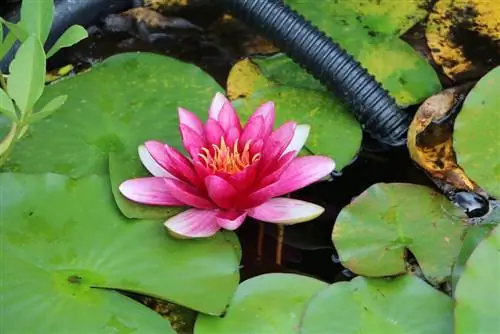
If the above steps are followed and you observe the animals and the pond with sensitivity, you can have permanently he althy animals and a clean pool. The larger the pond, the more constant the water quality and he alth in the pond can remain. In a small pond you should only use very few fish, because with less water the water can “tip over” more quickly. Regular checking of the water, the various values and the fish are very important to prevent diseases or fish deaths.
What you need to know about breathing air for fish
If fish stay mainly at the top of the water and gasp for air, then this is usually due to the components that are in your water tank:
- It is possible, for example, that you have integrated copper pipes into your garden pond or system. Some copper may come off here and get into the water.
- Possible cause could also be that the pH value of the water is too high. Measurements should be carried out here regularly, otherwise the fish can be poisoned due to excessive amounts of nitrite, for example.
- If such poisoning occurs, the fish not only gasp for air on the surface of the water, but also become increasingly slower, hardly move any more or even die after a while.
What can you do? - In any case, do not panic if these symptoms and behaviors described apply. Instead, replace around half of the water in the pool. In general, you should measure the nitrite value every day; it should not be higher than approx. 0.5 mg per liter. Otherwise, some of the water will have to be changed again.
The following can be said about the pH value: If it is below the important mark of 7, then it is the substance ammonium, which is present in the water and is harmless to the fish. If, on the other hand, it is above it, it is ammonia that has been created and that the fish absorb. Urgent action should be taken here to ensure that the fish are not poisoned by ammonia.
The solution:
Simply lower the pH to 6.9.

